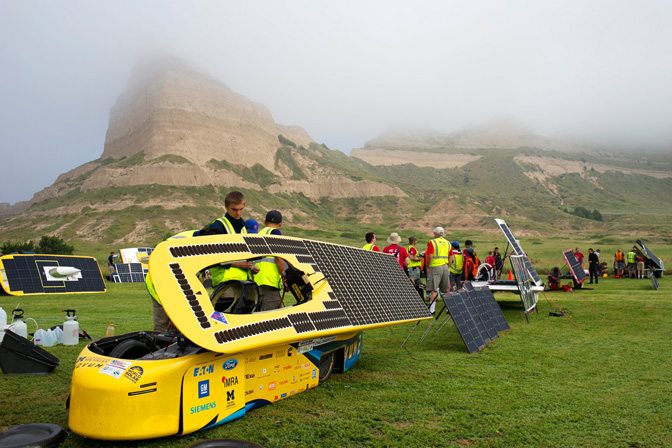
A second place finish for U-M Solar Car Team
‘I look at my teammates now and they’re hungry and they‘re fired up and when the next race comes they’re going to be ready.’

‘I look at my teammates now and they’re hungry and they‘re fired up and when the next race comes they’re going to be ready.’

In a tough race that crossed the Rocky Mountains, the University of Michigan Solar Car team placed second in the American Solar Challenge on July 22, 2018.
Novum, the smallest and most aerodynamic car U-M has ever built, crossed the finish line of the 9-day, 1,700-mile race just before 11:30 a.m. in Bend, Oregon. First place went to Western Sydney University. U-M finished just 16 minutes behind Western Sydney in one of the closest U.S. solar races in the event’s history.
“This year’s race crew is by far one of the youngest in recent history, and there were many challenges in making sure everyone was fully prepared and fully understood how the vehicle worked,” said Chae Woo Lim, a rising mechanical engineering junior and the team’s engineering director and crew chief. “But when you have such a dedicated group, such a challenge is not insurmountable.”

It’s a bittersweet podium finish for the team. U-M has finished first in this race six consecutive times. And this contest was a follow up to Novum’s debut at the World Solar Challenge in 2017, where the car finished second—the best world finish in the team’s history. But hotter-than-expected weather and a challenging course pushed Novum and the U-M team to their limits.
Novum’s single-hull design is a radical departure from the proven catamaran that dominates the field. It was the only car like it in this race. Since the world race, the team added a new roll cage, canopy and supplemental solar array to meet American Solar Challenge regulations without sacrificing performance. The team also added a second motor to help push Novum through the mountains. It was this refinement that ultimately led to temperature problems on the road.
“The car was designed for the World Solar Challenge and we modified it for the ASC and one thing we had not expected in terms of performance was our battery had overheating issues,” said Lim. “This was due to the ambient temperature—our longest days were over 100 degrees Fahrenheit—and because of all the hills.”
There were other challenges as well. On the first day of the race, one of Novum’s tires blew out, costing the team valuable time. Later in the week, rain and dense fog slowed the race as seeing the road became difficult.
With the race behind them, Lynne Bekdash, the Michigan Solar Car Team’s business director, was disheartened team didn’t keep the American Solar Challenge win streak the team had established over the last decade.
“No one is more disappointed than we are,” said Bekdash. “We put that time and effort in, but at the end of the day, we finished and we definitely went down fighting. It takes a strong team to look at yourself and say what did you do wrong. I look at my teammates now and they’re hungry and they‘re fired up and when the next race comes they’re going to be ready.”
Team leaders found lessons in the finish.
“We learned that every little things counts,” said Noah Bearman, project manager and a rising senior studying computer science. “The little things add up. We suffered from some penalties, which should have been avoided.”
Just before the race start, officials notified the team that several wheel bolts were illegal. The team didn’t have time to adjust, so they were penalized several minutes per day (not enough to change the outcome.) This year’s American Solar Challenge, a biennial race that takes place on different courses across America, started on July 14 in Omaha, Nebraska. This marks the University of Michigan’s 28th year of solar racing.